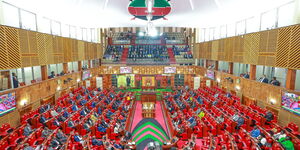Naivas Supermarkets Chief Operating Officer (COO) Willy Kimani has explained what led to the downfall of retail chains Uchumi and Nakumatt.
During an interview with NTV, the senior official attributed the failure of both the public and private supermarkets to poor corporate governance.
"Fixing corporate governance would have nipped the problems that the supermarkets were experiencing and enable them to remain profitable," he conveyed.
[caption caption="Naivas Supermarkets Chief Operating Officer (COO) Willy Kimani "] [/caption]
[/caption]
Kimani further stated that the retailers' expansion strategy by using short-term loans and supplier financing was wrong and got them into debt.
"They affected their cash flow by using expensive debt such that any change by calamities such as the Westgate attack that affected Nakumatt, caused their books to be in the red.
"Even with the interest capping, banks look at your record whether your loans have ever been recalled. Which if is the case will be difficult to get bank credit to stock their branches," Kimani stated.
He added that collusion between parties could have affected the profitability of the retailers giving an instance of signing for goods which had not been delivered due to internal shrinkage.
Kenyans.co.ke has established that internal shrinkage is a business term used to describe a scenario where stock that has not been accounted for is attributed to external or internal theft by employees.
Some of the types of employee theft include discount abuse, refund abuse, and even credit card abuse.
"Shrinkage should be at a maximum level 0.5%, but when the level of between 2.5-3% in an industry where the net margins are between 3-4% then that's a big problem," he explained.
The Naivas COO stated that another cause of failure was the supermarkets' failure to properly evaluate branches individually on how profitable they were for the entire chain.
[caption caption="Nakumatt Supermarket"] [/caption]
[/caption]
"Another problem is them not looking at basic unit profit and loss on a unit by unit basis (assessing if each store is profitable).
"It does not make sense for you to expand into other countries when local units are operating at losses," he maintained.
He also highlighted that setting up stores within the country without a proper understanding of the complexities of serving the markets' needs was a contributing factor.
Here is the video courtesy of NTV:
[video:https://youtu.be/qctibq0bErY]

High Court Suspends Police Recruitment Breaking News











